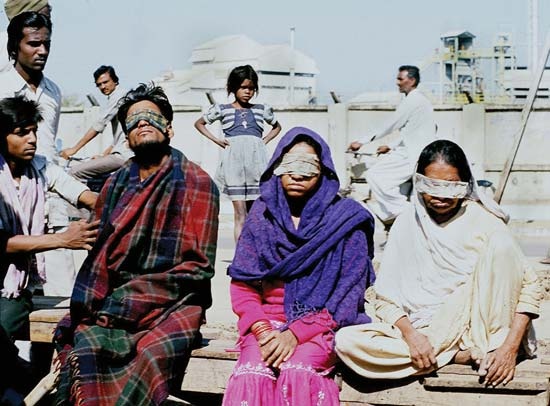Bhopal disaster
industrial accident
 chemical leak in 1984 in the city of Bhopal, Madhya Pradesh state, India. At the time it was called the worst industrial accident in history.
chemical leak in 1984 in the city of Bhopal, Madhya Pradesh state, India. At the time it was called the worst industrial accident in history.On Dec. 3, 1984, about 45 tons of the dangerous gas methyl isocyanate escaped from an insecticide plant that was owned by the Indian subsidiary of the American firm Union Carbide Corporation. The gas drifted over the densely populated neighbourhoods around the plant, killing thousands of people immediately and creating a panic as tens of thousands of others attempted to flee Bhopal. The final death toll was estimated to be between 15,000 and 20,000. Some half a million survivors suffered respiratory problems, eye irritation or blindness, and other maladies resulting from exposure to the toxic gas; many were awarded compensation of a few hundred dollars. Investigations later established that substandard operating and safety procedures at the understaffed plant had led to the catastrophe. In 1998 the former factory site was turned over to the state of Madhya Pradesh.
At the beginning of the 21st century—some two decades after the chemical leak—more than 400 tons of industrial waste were still present on the site. Neither Dow Chemical Company, which bought out the Union Carbide Corporation in 2001, nor the Indian government had properly cleaned the site. Soil and water contamination in the area was blamed for chronic health problems and high instances of birth defects in the area's inhabitants. In 2004 the Indian Supreme Court ordered the state to supply clean drinking water to the residents of Bhopal because of groundwater contamination.
- Ramuz, Charles-Ferdinand
- Ramón Cabrera
- Ramón Castilla
- Ramón de Campoamor y Campoosorio
- Ramón Gómez de la Serna
- Ramón José Sender
- Ramón López Velarde
- Ramón María del Valle-Inclán
- Ramón María, duque de Valencia Narváez
- Ramón María Narváez, duque de Valencia
- Ramón Menéndez Pidal
- Ramón Pérez de Ayala
- Ramón y Cajal, Santiago
- Ramādī, Al-
- Rana
- Ranade, Mahadev Govind
- Ranaivo, Flavien
- Rana Pratāp Singh
- Rancagua
- Rance River
- ranch
- ranch house
- Ranchi
- Rancho Cucamonga
- rancidity